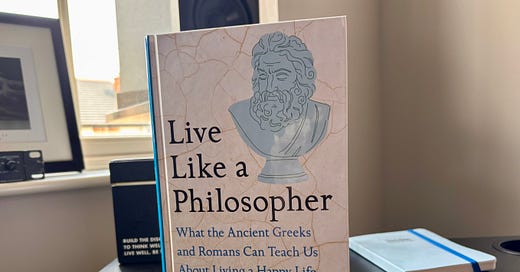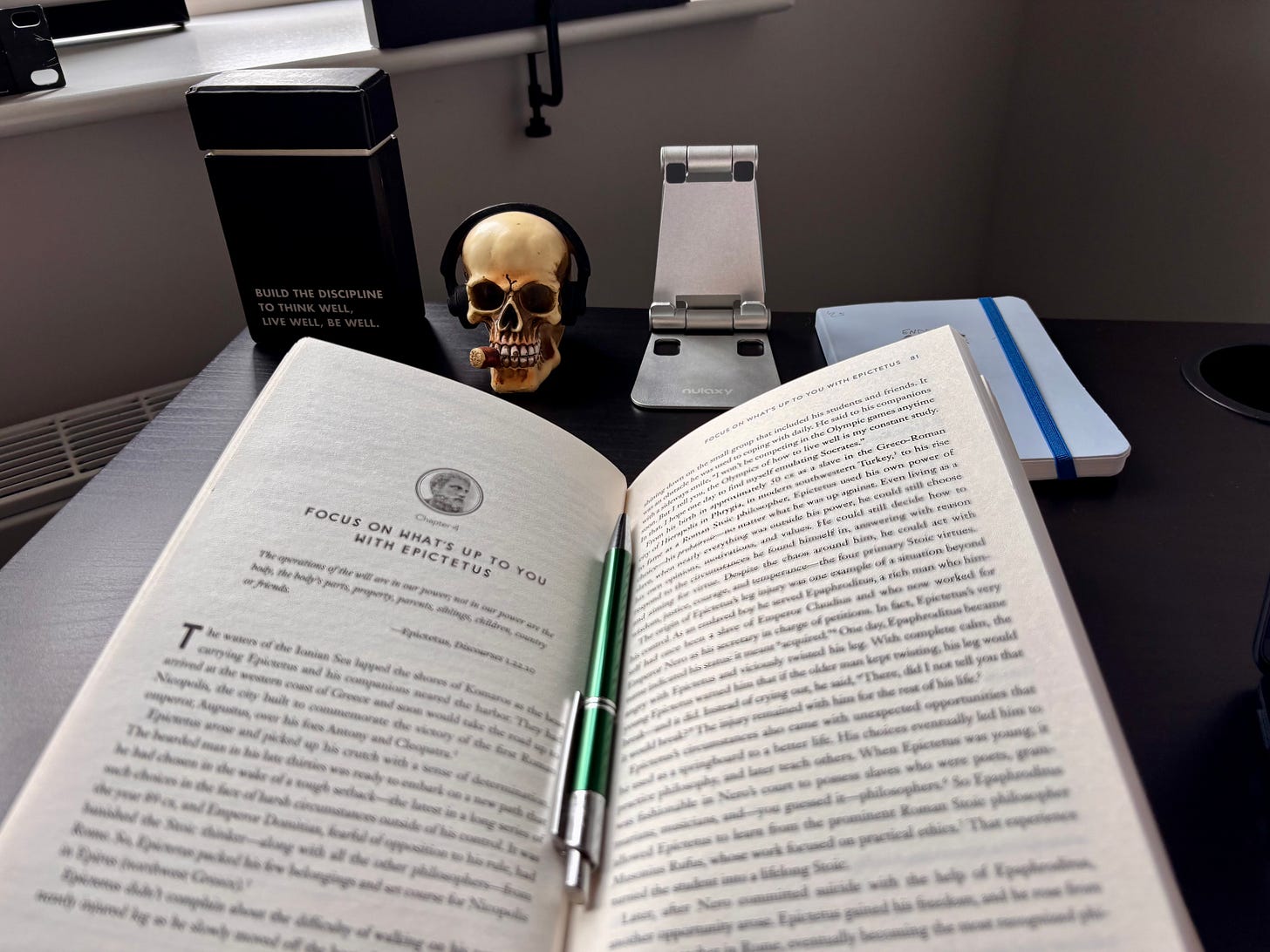Review: Live Like a Philosopher (Beyond Stoicism)
A must read for those tired of modern self-help
If Socrates sat down in a café today, coffee in one hand and phone in the other, he might wonder where we went wrong. But if you handed him Live Like a Philosopher, he’d probably lean back and mutter, “At least someone remembers what we were on about.”
I’m a bit like the third leader of Stoicism, Cleanthes, in my approach to reading and reviewing books. I like to take my time and digest everything. In fact, I’m writing this two months after finishing the book.
has been carrying the Stoic torch for a while now and teams up again with , and for the first time, in this latest work.Cleanthes was known for his slow and almost sluggish way of living, earning him the nickname “the Ass” (or Donkey) from other students of the time—due to his more deliberate approach to learning.
Together, they guide us through various ancient philosophical schools and thinkers. Not just Stoicism, but also Epicureanism, The Cynics, Megarian school, and even the less-discussed Cyrenaics.
Live Like a Philosopher is meant to be experienced. It’s like stepping into a time machine and visiting each school of thought at its peak. Each chapter breaks down a philosophical tradition, explores its key ideas and the life of its prominent figurehead, and most importantly, shows you how to try it out in your own life.
If you’ve read Massimo and Greg’s previous work, you’ll be familiar with this practical, exercise-based approach to philosophy.
Each section closes with one or more exercise. Essentially, something to action, often over several days, rather than just reading and moving on.
It’s like a philosophical workout. One chapter has you questioning everything with Socrates; the next, you’re exploring the ethics of true pleasure with Epicurus.
These aren't just ideas → they’re ways of life, to be practised, and remembered.
This book doesn’t preach or drone on. It doesn’t pretend the ancients had all the answers, and it certainly doesn’t treat them like Gods or Sages. Instead, the authors present their ideas honestly, showing where each thinker shines, and indeed where they fall short.
Still, for a first step into the river, Live Like a Philosopher offers clear water and a and a steady path to sail on.
To my fellow comrades interested in Stoicism; Chapter 4 is where it’s at. A well-thought out section on the teachings of Epictetus.
That said, you’ll want to get to grips with the other schools of thought too (and you should).
This book is serious without being sanctimonious. It’s intelligent without being overly academic, it’s honest about the fact that living well isn’t a destination or a quick fix—but a discipline.
As Epictetus once said: “Don’t explain your philosophy. Embody it.”
Well, now we’ve got the insight to do just that, in one single book. The best thing is, you can pick the philosophy that most aligns with you.
This book doesn’t just give you the key information behind each philosopher or school—it gives you the confidence and ability to go out and apply it in the real world.
And to me, that’s what really matters.
A universal link to the book if you’re interested → https://g.co/kgs/8ftcjic
The Simple Pleasures Audit
Inspired by the teachings of this book, and the philosophy of Epicurus:
The aim of this exercise is to help you recognise and cultivate the kind of pleasures that truly contribute to a tranquil and happy life.
Instructions:
List or think about 5 recent pleasures you’ve experienced.
These could be anything: eating your favourite meal, a conversation with a friend, reading a book, buying new clothes, or a gadget etc.Categorise these:
Natural and necessary (e.g., nourishing food, friendship, rest)
Natural but unnecessary (e.g., luxury food, fancy gadgets)
Vain and unnecessary (e.g., fame, excessive wealth, approval-seeking behaviour)
Reflect on this:
Which of these gave you a lasting sense of peace or joy?
Which left you wanting more, or feeling no better shortly after?
Choose one “natural and necessary” pleasure to intentionally enjoy tomorrow.
For example: sharing a slow meal with your family, taking a mindful walk, or enjoying a quiet moment, without distractions.At the end of the experience, journal or reflect:
How did it feel to focus on that simple pleasure?
Did it feel more satisfying than some of the usual, “louder” pleasures you chase?






Thank you, Enda, for reading and sharing your thoughts about our book! I am happy that you found our approach to bringing the philosophies to life useful. We really did want to convey “how to live like a philosopher” for readers!
I just bought a copy a few days ago, so really glad to hear that you found it useful.